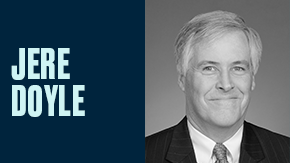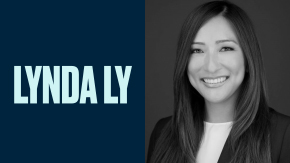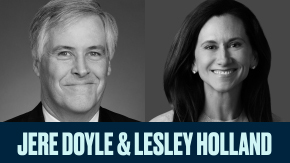DATE PUBLISHED: MAY 11, 2022
When you have a substantial amount of wealth, it makes sense to think about your balance sheet like an institution. This means reviewing your expenditures periodically to account for personal spending habits, as well as external factors like market performance and inflation. According to Terry Sylvester Charron, Head of Investment Advisory and Planning Solutions at BNY Wealth, it’s the small items like travel, entertainment and gifts to charitable entities that tend to add up. It’s important to be aware of what you typically spend during a calendar year to ensure the longevity of your wealth. Listen to this episode of Your Active Wealth to find out how an efficient spending plan draws from realistic needs, conservative market expectations and long-term goals.
Subscribe to Your Active Wealth on your favorite podcast platform via Apple Podcasts, Spotify, Amazon Music, Pocketcast and more.
Featuring: Terry Sylvester Charron, Head of Investment Advisory and Planning Solutions, BNY Wealth
VO [00:00:01] Is your wealth strategy supporting your long-term goals? Welcome to Your Active Wealth with BNY Wealth, where we offer insights that can help you move closer to your goals. We'll tackle timely topics through the lens of the five pillars that comprise our Active Wealth framework, Invest, Spend, Manage, Borrow and Protect, and provide guidance on navigating the unpredictable, to help you build and sustain wealth.
Ben [00:00:30] Hi and welcome to Your Active Wealth. I'm your host, Ben McGloin. Small changes in spending can significantly impact your overall wealth, as well as the ability to meet long-term goals. Today, I'll be speaking with Terry Sylvester Charron, head of investment advisory and planning solutions at BNY Wealth, and we'll be talking about ways to rein in spending when the macro environment or your personal circumstances call for it, as well as how to view it in a more holistic manner within the greater context of your overall portfolio and your ability to create and sustain wealth. Terry, welcome to the show. We're happy to have you.
Terry [00:01:05] Thanks so much, Ben. It's a pleasure to be joining you here today.
Ben [00:01:08] So, Terry, we often hear and see how institutions such as defined benefit plans and nonprofit endowments preserve and grow their assets by setting clear spending targets that's flexible enough to respond to changing circumstances. So could you perhaps share some of those spending efficiencies that perhaps individuals could potentially benefit from?
Terry [00:01:26] Sure. You know, Ben, institutions are successful from a spending perspective because they take advantage and have a very disciplined approach to determining their spend rate. So, for example, back in the 70s, the Ford Foundation implemented a method of spending known as the moving average spending rule in which a fixed spending rate is applied to a three-year average portfolio value. Today, we believe our clients can benefit from the same disciplined approach by instituting a disciplined but perhaps more dynamic spending plan. One that addresses lifestyle needs, responds to market conditions and sustains wealth over multiple generations. The annual spending rate of a dynamic spending strategy is adjusted as markets change, protecting portfolio principle during market downturn. So the essence is really just providing that disciplined approach to spending, which I think is important and things we can take from institutional investors.
Ben [00:02:28] Terrific. So you talked about changes there in spending plans. So what impact does a small increase in annual spending have on total wealth? Terry [00:02:36] That's a great question. And Ben, let me just start by saying we typically use a pretty powerful, proprietary forecasting tool that's internally referred to as Advice Path that can help our clients assess how spending decisions can affect their wealth over time. So, for example, we recently worked with a client with assets of roughly $20 million. We found that over a 20-year period, using a 5% annual portfolio return and a 4% annual spend rate, we were able to show our clients that their portfolio would grow to just $21.1 million over a 20-year period. However, if they reduce their spending to an annual rate of 3%, that same portfolio would grow to $29.7 million over the same 20-year period, so an increase of 29% by simply cutting spending by 1%. This difference may or may not be significant depending on overall goals and objectives of the client.
Ben [00:03:37] And I suspect you're talking about spending, expenses and understanding expenses are probably one really key input. Maybe what are some of the common challenges around understanding expenses and really sticking to that appropriate spending plan?
Terry [00:03:51] Well, I think the challenge for most investors when it comes to spending isn't really accounting for the big-ticket items like taxes. It's the sometimes smaller items like travel, entertainment and gifts to family members and charitable entities that can really add up. Some of our clients find it helpful to review their previous year spending in January or February to assess what their spending needs will be in the coming year. This is a great opportunity to reconcile their rough mental accounting to actual expenditures through the year. I think much like the importance of updating a balance sheet or net worth statement annually, clients find it helpful to understand their annual spending habits and make adjustments up or down based on their needs and overall goals.
Ben [00:04:37] And I assume there's kind of personal factors, aside from just portfolio value that factor into determining appropriate spending levels, can you maybe share some of those?
Terry [00:04:47] Well, certainly age is one factor. Needs and portfolio performance all impact a family's ability to spend in the future. However for some families, it's helpful to think about spending in buckets. So think about one bucket might be the money they need for the next five years. One might be the money they need to spend in their lifetime. And maybe the third is money that they hope to pass down to their future generations. The funds that are meant to sustain investors in their lifetime, spending may need to be adjusted based on significant market outperformance or underperformance. Age does play a role just in the sense that older investors tend to spend less, less on things like travel and entertainment, but sometimes that spending is being replaced by healthcare. So age in and of itself isn't that important in terms of developing the appropriate spend rate.
Ben [00:05:44] And so when you've determined those factors and start to put together a smart spending plan, what are kind of the key and the core components of a smart spending plan? Maybe talk through some of those elements?
Terry [00:05:56] I think one of them obviously was we take a page out of institutions playbook, but I think any smart spending plan is informed by realistic needs, conservative expectations for what market performance and volatility might be in the future, consideration of immediate and long-term goals and objectives, and the flexibility to adjust as any of those factors change. A client recently asked what the probability of maintaining their portfolio principle over the next 20 years would be if they're spending 2% a year? And again, based upon our capital market assumptions, the client has roughly an 84% chance of maintaining principle over a 20-year period, which is pretty good. But increasing that spend rate by 1% to 3%, the probability of maintaining that same principle drops to 75%. And interestingly enough to 61% if spending is increased to 4% annually over the next 20 years. So better than a 50% probability based on some pretty conservative assumptions about market returns going forward.
Ben [00:07:07] So you talked about probabilities. Is there a minimum probability that's needed to manage and sustain wealth efficiently?
Terry [00:07:14] Well, I think if the goal is to maintain wealth as opposed to spend over their lifetime, I think somewhere in that 70% to 80% probability range will generally leave clients with the comfort that they'll have enough to support themselves in their lifetime and then leave a little to their children at the end.
Ben [00:07:33] And any advice around you mentioned kind of beginning of the year looking at expenses or reviewing for the prior year. But how often should one really be checking in with their wealth manager to reevaluate potential changes to their personal circumstances and I guess, ultimately address and tweak their spending plan?
Terry [00:07:50] Again, I'm going to say like institutions, a regular review of a spending plan is really appropriate, and we recommend at least an annual review of 12-month expenditures. I think it's also a good idea to do a stress test of the impact of portfolio performance based on spending level and again, some expectations for market returns going forward every few years. If there are any major changes in spending needs or market expectations, it might also be a good time to revisit spending plans.
Ben [00:08:21] And so obviously, as we think about the current backdrop, what's going on, more heightened market volatility, heightened inflation. Just curious in terms of some broad tips for our listeners in terms of how to really manage spending during these periods of more heightened market volatility and inflation. Should spending during ideal market economic conditions differ much during these periods?
Terry [00:08:44] Yeah, that's a great question. And it's one we're fielding from our clients all the time. I think, generally speaking, we find that reducing spending after a year in which a portfolio has declined by more than 3% and increasing spending in other years can add up to 40 basis points or 0.4% in additional wealth annualized over a 20-year period. While we currently are experiencing heightened inflation, we don't believe inflation will stay at these levels over time. But this higher inflation level and our expectations going forward, along with lower market return assumptions, these are all taken into consideration when we talk to our clients in a very disciplined way about their spending and the impact that spending will have on their portfolio over a longer-term period.
Ben [00:09:34] So you mentioned the word discipline there, and I'm just curious, is there advice you could provide to individuals in terms of how to potentially rein or maybe manage a lavish lifestyle that may not be appropriate? Based on their overall balance sheet? Or perhaps what's going on from a macro perspective. Is it too late to reform over spenders and really begin adhering to a smart spending plan?
Terry [00:9:55] First, I think it's never too late to plan. I think the advantage of utilizing analytical tools to help frame a spending discussion is that you can demonstrate how different spending levels will impact portfolios over different time frames and the impact of taxes and all those kinds of things. But I think the benefit to clients is the information they need to make those informed decisions about their spending and the impact those decisions will have and meeting their financial goals, but, ultimately it's their money and they can spend what they like. Our role is to make them informed spenders.
Ben [00:10:34] And as you inform them or help inform them, what type of questions and what type of items are you specifically looking to address there, Terry?
Terry [00:10:45] In terms of their spending?
Ben [00:10:46] Yeah.
Terry [00:10:47] Well, I think one of the ways that we help clients, one of the biggest ways and we've talked about this before is just trying to find any opportunity to lower their tax burden. So through capital gains, understanding capital gains where those gains are coming from, trying to offset gains with losses, where we can, trying to reduce expenditures and solutions in their portfolio. And there's a number of ways that we assist our clients from a tax perspective. Also, estate planning and finding strategic ways to maybe better transfer wealth to next generations, so lowering the overall tax burden, I think, is one of the ways that we try to help our clients control at least one of the biggest spending items on their annual spend, which is taxes. Outside of that, trying to help a client understand where they're spending and how their spending goes a long way in terms of those discussions about where tax, where savings can come from.
Ben [00:11:47] So the bottom line really is that taking the initiative to understand your spending habits and creating an appropriate spending plan with an advisor really can help you sustain your wealth like an institution. Well, thanks, Terry. Really appreciate you joining us today.
Terry [00:12:01] It was my pleasure. It's good to be with you.
Ben [00:12:03] Well, clearly, as you've articulated, there are many factors that could influence a carefully constructed plan. So it really is important to check in with your advisor periodically to ensure that any predetermined spending parameters still suit your needs and are keeping you on track for your success. Thanks for joining and we'll see you on our next episode of Your Active Wealth.
VO [00:12:23] Thank you for listening to this episode of Your Active Wealth. Be sure to subscribe to this podcast on Apple Podcasts, Spotify, Google Podcasts or Stitcher and visit bny.com/wealth to view the latest insights on the subjects that matter most to you.
As of September 2023, Ben McGloin is no longer working at BNY Wealth. BNY is the corporate brand of The Bank of New York Mellon Corporation and may be used to reference the corporation as a whole and/or its various subsidiaries generally. This material does not constitute a recommendation by BNY of any kind and is provided for illustrative/educational purposes only. The information herein is not intended to provide tax, legal, investment, accounting, financial or other professional advice on any matter, and should not be used or relied upon as such. Effort has been made to ensure that the material presented herein is accurate at the time of publication. However, this material is not intended to be a full and exhaustive explanation of all of the investment or financial options available. The information discussed herein may not be applicable to or appropriate for every investor and should be used only after consultation with professionals who have reviewed your specific situation. This material, and the statements contained herein, are not an offer or solicitation to buy or sell any products (including financial products) or services or to participate in any particular strategy mentioned and should not be construed as such. Any investment strategies referenced in this material come with investment risks, including loss of value and/or loss of anticipated income. Past performance does not guarantee future results. The views expressed within this material are those of the contributors and not necessarily those of BNY. BNY has not independently verified the information contained in this material and makes no representation as to the accuracy, completeness, timeliness, merchantability or fitness for a specific purpose of the information provided in this material. BNY assumes no direct or consequential liability for any errors in or reliance upon this material. BNY will not be responsible for updating any information contained within this material and opinions and information contained herein are subject to change without notice. This material may not be reproduced or disseminated in any form without the prior written permission of BNY. Trademarks, logos and other intellectual property marks belong to their respective owners. ©2025 The Bank of New York Mellon. All rights reserved. WM-734149-2025-05-05
Listen to more episodes

Alicia Levine and Dan Clifton on 2026: consumer refunds, deregulation, Fed cuts, tariffs and midterm dynamics—why policy could turn headwinds into tailwinds for growth and earnings.

Terry Sylvester Charron, head of investment advisory and planning solutions, and Jere Doyle, senior wealth strategist, unpack changes to Qualified Small Business Stock as result of OBBBA.

Scott Lillis, regional president, Mid-Atlantic Region, and Lynda Ly, private banking manager, explain our strategic cash management framework

With the One Big Beautiful Bill Act (OBBBA) recently signed into law, a host of tax changes are set to go into effect, impacting high net worth individuals and the wealth plans they have in place.